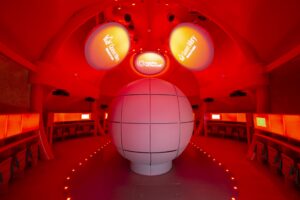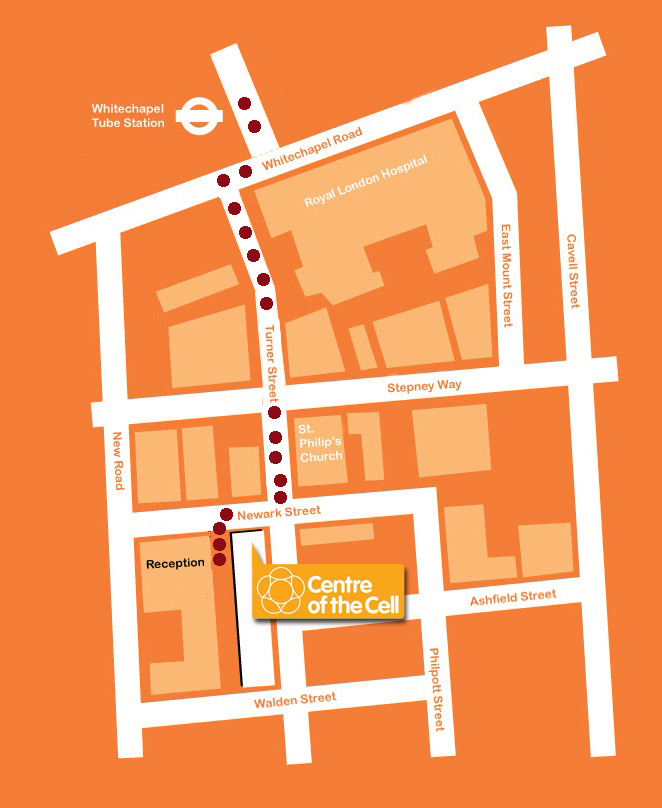Accessibility
We want Centre of the Cell to be an accessible, diverse and enjoyable environment for all visitors, where everyone can learn and feel included in science, especially those who have not felt included before. We are working to increase our accessibility offer so that all visitors can engage with our content and sessions and walk away having a more positive attitude towards science.
We are running an SEND consultation to help us improve accessibility at Centre of the Cell. If you have any suggestions about how we could make Centre of the Cell more accessible to you and others, or if you would like to get involved with the consultation process, please get in contact with Jessica Moon (Learning Team Leader) on: jessica.moon@qmul.ac.uk
We appreciate your support, so participation in the consultation process will result in the opportunity to take part in some discounted and free shows!
Planning Your Visit
For specific information on how to get to us, please visit our Getting Here page.
Disabled parking is available in the Blizard Yard and must be booked in advance. If you require a disabled parking space or drop-off point, please contact us on 0207 882 2562, or email us at info@centreofthecell.org.
We have a brand new Visual Story for Centre of the Cell, which includes sensory information about the building and your visit as well. We would appreciate any feedback on how to improve this, so please do pass on any comments by email or in person.
We are part of the Sunflower Lanyard scheme. Not all disabilities are visible, and our staff are trained to recognise the pins, badges, cards and lanyards of the scheme. This allows us to discreetly identify that somebody may require additional support.
Centre of the Cell does not have a lunch space or indoor area where visitors can eat. There is a separate café within the Blizard Institute to purchase food. No food or drink is allowed inside STEM Pod, but snacks and drinks are permitted in our waiting area and in the Neuron Pod.
If you would like to visit us in advance of your booking, please contact us by phone or email to arrange a ‘pre-visit’. On these pre-visits, we will be able to show you our spaces and resources and answer any questions face-to-face.
During Your Visit
We are located on the first floor of the Blizard Institute, with step-free access available throughout. There is a lift that connects our ground and first floors, and the accompanying staircase also has a handrail.
There is a disabled toilet on both the ground and first floors. The nearest Changing Places toilet is located at the Tower of London.
Our waiting area is seated. There is also seating in both our STEM Pod and Neuron Pod. These seats do not have armrests, and the seats in STEM Pod do not have backrests.
We have brand new sensory backpacks available for use during your visit containing the following items:
- Magnetic whiteboard and timetable magnets
- Whiteboard pen and eraser
- Ear defenders
- A selection of fidget toys
- Wobble cushion for under the feet (on request)
- Flashcards for Neuron Pod shows (on request, limited availability)
If you would like to borrow one of these backpacks, please ask a member of staff at any point during your visit. If you have any feedback on these backpacks or suggestions for other items to include, please do let us know at info@centreofthecell.org.
After Your Visit
Was there anything that we could have done to improve your visit? If so, please let us know at info@centreofthecell.org.
STEM Pod
Our STEM Pod is a very exciting experience, but it can sometimes be overwhelming, especially for those who are not sure what to expect. Please see below for a step-by-step rundown of what happens in a STEM Pod show. If you would like more detail about any section of the show, please contact us on info@centreofthecell.org.

- On entering the STEM Pod, there will be soft music playing and an orange-lighting in the room. Please see the image to the right for the view from the doorway. You will be asked to take a seat on one of the chairs around the edge of the room.
- When the staff member present begins the show, they will speak on a microphone and then the lights will dim, the music will stop, and a video will play on the the Nucleus (the pod in the centre of the room) and the ceiling projectors.
- When the film finishes, the lights will come back up again, some of the lights will flash, and a warning siren and voice will announce that the Nucleus is about to open. The doors will open, and then the siren/voice will stop and the lights will stop flashing. The staff member will give a brief introduction over the microphone, and then you will be invited to play the games.
- The games themselves have their own sound effects/voice tracks that differ depending on the game. Lab Bench Chaos has a siren and flashing lights if the game is lost (by the cells in the game becoming contaminated). The games use touch foils to work, which involve touching the surface of the table in front of the game to give commands.
- After usually around 20 minutes, a voiceover will announce a countdown (usually five minutes remaining, with a further announcement every minute) and you will be asked to sit back down again at the end of it. When everyone is ready, the staff member will begin the next section. The warning siren and voiceover will announce that the doors of the Nucleus are closing while they close, the lights will dim again, and another video will play on the Nucleus and then above you on the ceiling projectors.
- Following this film, the same opening process will occur (flashing lights, warning voice, nucleus doors opening) and the staff member will give another brief introduction over the microphone. You will then be invited to play the games again. There will also now be human organ samples and other similar objects visible behind glass around the edge of the room.
- There will be another countdown after a further roughly 20 minutes, you will be asked to sit down again, and following the same process as before, the doors will close, the lights will dim, and a final film will play.
- After this film, the lights will come back up again and the soft music from the beginning will begin again. You will then be brought back out of the STEM Pod through the door that you entered through.
Shows and Workshops
General show guidance:
- Audience participation (demos, questions, shouting out) – this can be changed with pre-warning, so if you don’t want this, tell us and we will be happy to adapt this
- Neuron Pod is dark when the lights are dimmed during shows
- Neuron Pod lighting can be quite bright when all the lights are on during entrance and exit
- There is some coloured lighting
- Most shows contain music for timed activities (i.e. competitions)
- It can get loud in Neuron Pod when lots of people are talking at the same time
General workshop guidance:
- All audience members are expected to participate in the activities, but if somebody would rather just watch or sit out of part/all of the activities they can – just let the presenter know in advance
- The main lights stay on throughout the workshop so it may be too bright for some individuals (but the lighting can be changed on request)
- Some activities are tactile (touching and using objects)
- There will be moving around to get from table to table – this can be changed with pre-warning, so if you don’t want this, tell us and we will be happy to move the activities around rather than the people
- Some workshops have a buzzer noise to signify movement to the next table (this can just be the presenter’s voice if preferred)
- At least one person at the table will need to read an instruction sheet, but this can be an adult or teacher
A Mummy for Melissa:
- Use of strawberries and surgical spirit (smells and allergies)
- Use of brightly coloured puppets
- A bubble machine is used – the machine makes a quiet humming sound and the bubbles may travel over the audience
Snot, Sick and Scabs:
- The (fake) sick can smell
- The texture of the snot may be unpleasant (only one volunteer will interact with it and gloves are provided)
Gut Feeling:
- The (fake) poo can have an unpleasant texture (only one volunteer will interact with it)
- Use of banana, bread, coffee, oats and coloured water (some smells but not strong unless you are the volunteer for this section)
- This show has a high number of volunteers
In a Heartbeat:
- High audience participation numbers
- Costumes may be used for some demos (e.g. hats, aprons)
- Some realistic animations and images are used in the presentation to depict anatomical features
Genes and Evolution Show:
- Costumes are used for some demos (e.g. headbands, backpacks, jackets, eye mask, cloak)
CELLebration:
- Automatic pipettes require some thumb strength and precision (the activity can be done without this equipment)
Key Stage 2 Lab Careers Day:
- Automatic pipettes require some thumb strength and precision (the activity can be done without this equipment)
- Costumes used for some demos (e.g. lab coat, gloves, goggles)
Invasion, Infection, and Immunity:
- Buzzers (not overly loud)
- Blindfold used in one activity (not compulsory)
- Putting hands in a box of small balls for two activities – these boxes do make noise when shaken or interacted with
- One activity involves talking to scientist
Careers in Science and Health:
- Two activities involve talking to a scientist, and a medical or dental student
Ingenious Genes:
- Includes a taste test (PTC strips – a bitter flavour if you have the PTC gene)
- Costumes used for some demos (e.g. lanyards, wigs)
If any of these warnings are of concern, or you want to find out more information about a specific show or workshop please get in contact by emailing info@centreofthecell.org, we will be happy to help.
Visual Story
Click on the button below to download a copy of our Visual Story.

Questions?
If you have any questions, concerns, or feedback please feel free to contact us:
Telephone:
0207 882 2562Email:
info@centreofthecell.org
